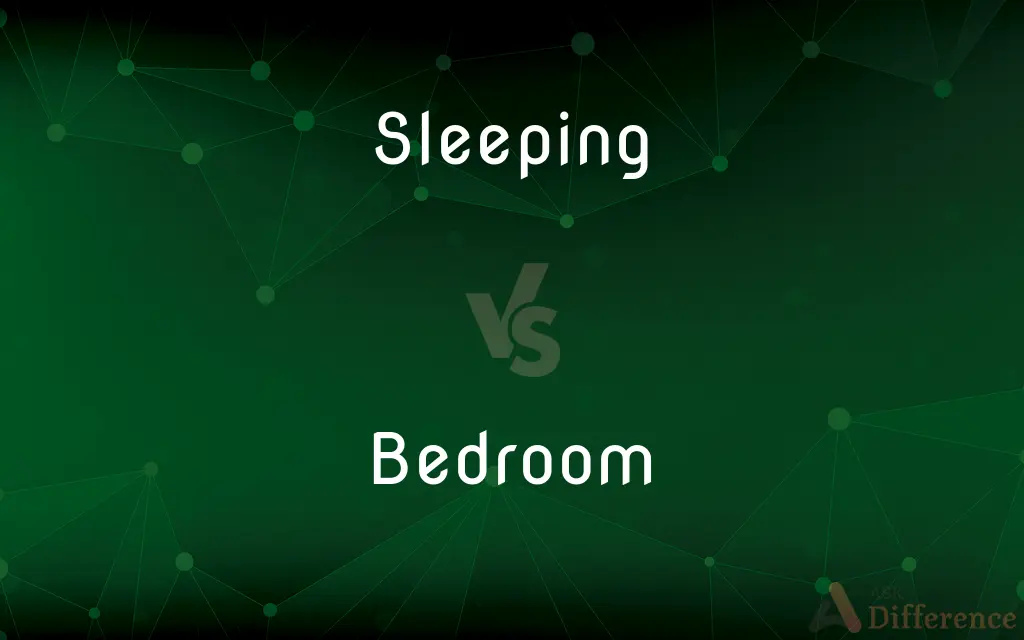Sleeping vs. Bedroom — What's the Difference?
By Maham Liaqat & Urooj Arif — Updated on March 26, 2024
Sleeping is the act of resting in a state of reduced consciousness, while a bedroom is a room designated for sleep.

Difference Between Sleeping and Bedroom
Table of Contents
ADVERTISEMENT
Key Differences
Sleeping is a physiological process essential for health and well-being, involving cycles of REM and non-REM stages that contribute to physical and mental restoration. Bedrooms, on the other hand, are spaces within homes or accommodations designed specifically for sleeping, often furnished with a bed and storage for personal items, promoting a comfortable and conducive environment for rest.
While sleeping can technically occur in any location where an individual can relax and fall into a state of unconsciousness, bedrooms are specifically arranged to support the quality of sleep through elements such as darkness, quiet, and temperature control. This distinction highlights the dynamic between the biological necessity of sleep and the cultural and personal importance of creating a dedicated space for it.
The quality of sleep can be significantly influenced by the environment, with bedrooms typically offering the optimal conditions, such as minimal noise, comfortable bedding, and the absence of distractions. In contrast, sleeping in environments not specifically designed for rest may not provide the same quality of sleep, demonstrating the functional importance of bedrooms in daily life.
Furthermore, bedrooms often reflect personal tastes and comfort preferences, with their decoration and furniture selection aiming to create a peaceful and personalized atmosphere. This personalization can enhance the psychological benefits of the space, making it not just a place for sleeping but a sanctuary for relaxation and privacy.
The act of sleeping and the architectural space of the bedroom are thus interconnected, with the quality and design of the bedroom having a direct impact on the effectiveness and rejuvenation provided by sleep. This connection underscores the importance of considering both the physical and environmental factors in discussions about rest and well-being.
ADVERTISEMENT
Comparison Chart
Definition
The act of resting in a state of reduced consciousness to restore energy.
A room in a dwelling designed specifically for sleeping.
Function
Biological necessity for health and well-being.
Architectural space designed to enhance sleep quality.
Requirements
Quiet, darkness, comfortable position.
Bed, conducive environment (dark, quiet, appropriate temperature).
Location
Can occur anywhere one can relax and fall unconscious.
Specifically designated room within a home or accommodation.
Impact on Health
Essential for physical and mental restoration.
Environment can significantly influence sleep quality.
Personalization
Sleep quality can vary based on individual health and habits.
Often reflects personal tastes and comfort preferences.
Compare with Definitions
Sleeping
Can be influenced by various external and internal factors.
Stress and noise are known to negatively affect sleeping.
Bedroom
A room within a dwelling for the purpose of sleeping.
They decorated their bedroom with soft colors to promote relaxation.
Sleeping
A natural periodic state of rest for the mind and body.
Getting enough sleeping is crucial for maintaining good health.
Bedroom
Reflects personal tastes and can serve as a private sanctuary.
He considered his bedroom a personal retreat from the world.
Sleeping
The act of lying in a state of reduced consciousness.
He found sleeping under the stars to be a unique experience.
Bedroom
Designed to offer an optimal environment for rest.
The hotel's bedrooms were designed for ultimate comfort and tranquility.
Sleeping
A process involving cycles of REM and non-REM stages.
The study focused on the importance of REM cycles in sleeping.
Bedroom
Often contains a bed and furniture for personal items.
Her bedroom featured a large closet and a comfortable armchair.
Sleeping
Essential for restoring energy and facilitating growth and healing.
Doctors emphasize the role of sleeping in the recovery process.
Bedroom
The layout and decoration can affect sleep quality and relaxation.
The layout of the bedroom was carefully planned to ensure a peaceful night's sleep.
Sleeping
A natural periodic state of rest for the mind and body, in which the eyes usually close and consciousness is completely or partially lost, so that there is a decrease in bodily movement and responsiveness to external stimuli. During sleep the brain in humans and other mammals undergoes a characteristic cycle of brain-wave activity that includes intervals of dreaming.
Bedroom
A bedroom is a room situated within a residential or accommodation unit characterised by its usage for sleeping. A typical western bedroom contains as bedroom furniture one or two beds (ranging from a crib for an infant, a single or twin bed for a toddler, child, teenager, or single adult to bigger sizes like a full, double, queen, king or California king [eastern or waterbed size for a couple]), a clothes closet, and bedside table and dressing table, both of which usually contain drawers.
Sleeping
A period of this form of rest.
Bedroom
A room in which to sleep.
Sleeping
A state of inactivity resembling or suggesting sleep; unconsciousness, dormancy, hibernation, or death.
Bedroom
Relating to or inhabited by commuters
Bedroom suburbs.
Sleeping
A state in which a computer shuts off or reduces power to its peripherals (such as the display or memory) in order to save energy during periods of inactivity.
Bedroom
A room in a house where a bed is kept for sleeping.
Please don't enter my bedroom without knocking.
Sleeping
(Botany) The folding together of leaflets or petals at night or in the absence of light.
Bedroom
A room or apartment intended or used for a bed; a lodging room.
Sleeping
A crust of dried tears or mucus normally forming around the inner rim of the eye during sleep.
Bedroom
Room in a bed.
Then by your side no bed room me deny.
Sleeping
To be in the state of sleep or to fall asleep.
Bedroom
A room used primarily for sleeping
Sleeping
To be in a condition resembling sleep.
Sleeping
To pass or get rid of by sleeping
Slept away the day.
Went home to sleep off the headache.
Sleeping
To provide sleeping accommodations for
This tent sleeps three comfortably.
Sleeping
Present participle of sleep
Sleeping
Asleep.
Sleeping
Used for sleep; used to produce sleep.
Sleeping
The state of being asleep, or an instance of this.
Sleeping
The state of being asleep
Sleeping
Quiet and inactive restfulness
Sleeping
The suspension of consciousness and decrease in metabolic rate
Sleeping
Lying with head on paws as if sleeping
Common Curiosities
Can decor in a bedroom influence sleep?
Yes, the decor that promotes a calm and relaxing atmosphere can enhance sleep quality.
Why is a bedroom important for sleeping?
A bedroom provides an environment optimized for sleep through quiet, darkness, and comfort, enhancing rest quality.
What are some common features found in bedrooms?
Common features include a bed, storage for personal items, lighting suitable for rest, and sometimes, privacy enhancements like curtains.
What makes a good bedroom for sleeping?
A good bedroom has comfortable bedding, minimal noise, appropriate temperature control, and is free from distractions.
Is it possible to get quality sleep without a bedroom?
While possible, achieving restful sleep is often more challenging without the controlled environment of a bedroom.
Why is sleeping essential for health?
Sleeping restores energy, supports cognitive function, and aids in physical healing, making it fundamental for overall health.
How can one improve their bedroom for better sleep?
Improvements can include investing in comfortable bedding, using blackout curtains, and minimizing noise.
How do light and noise affect sleep in a bedroom?
Excessive light and noise can disrupt sleep cycles, leading to poorer sleep quality, which is why bedrooms are designed to minimize these.
Can the quality of sleep be affected by the bedroom environment?
Yes, factors like lighting, noise, and bedding in the bedroom can significantly impact sleep quality.
How does sleeping in a non-bedroom environment affect rest?
Sleeping outside a dedicated bedroom may result in poorer sleep quality due to factors like noise, light, and discomfort.
How does sleep contribute to learning and memory?
Sleep plays a critical role in processing and consolidating new information, essential for learning and memory retention.
Why might someone choose to sleep in a different environment than a bedroom?
Personal choice, necessity, or seeking a unique experience, such as camping, might lead someone to sleep outside of a traditional bedroom.
Can sleeping habits affect bedroom design?
Yes, individuals might design their bedroom based on personal sleep habits, like reading before bed, necessitating a reading nook.
What is the psychological impact of having a dedicated bedroom for sleep?
A dedicated bedroom can create a sense of tranquility and security, promoting relaxation and aiding in better sleep quality.
What role does temperature play in a bedroom's design for sleep?
Maintaining a comfortable temperature is crucial, as it can significantly affect one's ability to fall asleep and stay asleep.
Share Your Discovery

Previous Comparison
Dieresis vs. Umlaut
Next Comparison
Derivation vs. ConjugateAuthor Spotlight
Written by
Maham LiaqatCo-written by
Urooj ArifUrooj is a skilled content writer at Ask Difference, known for her exceptional ability to simplify complex topics into engaging and informative content. With a passion for research and a flair for clear, concise writing, she consistently delivers articles that resonate with our diverse audience.














































